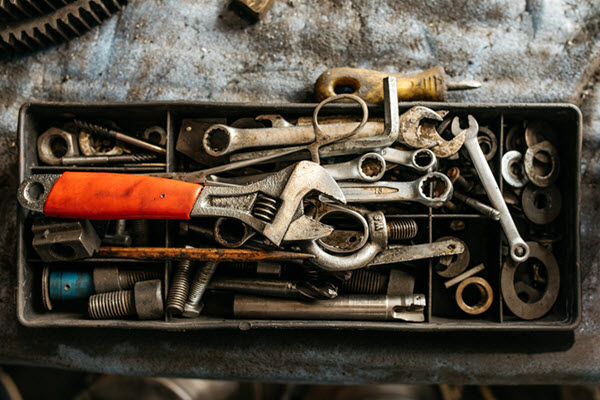I struggle with resetting the clock in my car’s dash when we make the daylight savings switch. Every time. Is that coming up again?

When confronted with wires and connectors behind my flat screen if something goes awry, my eyes glaze over.
Fuse boxes? Unless impeccably labeled, I’m at a loss.
What I have learned to manage: a Philips head screwdriver to tighten my saucepan handles when they loosen; changing batteries in my remotes and my smoke alarms; dealing with USB ports and Ethernet connections.
Not too impressive, I know.
I also get lost easily, though I use a GPS. (No sense of direction!) My mechanical ability is, well… if not nil, pretty close, though I am comfortable with mind maps and flow charts. But if you give me a box of tools and some “basic” fixing task?
I’m a veritable caricature in this domain. I need very, very, very simple instructions — preferably with illustrations!
Handy, I most assuredly am not. One of my sons, however, is a natural at all things mechanical. A regular fix-it man. And he has been since he was a child. A very young child. In this way, he takes after his father, who is extraordinarily adept at just looking at a thing and understanding how it works.
This has me pondering those “natural abilities” that some seem to possess. We certainly can and do benefit from nurturing them and building on them and having them encouraged by people, knowledge, and an environment of rewards.
 A child who takes everything apart (leaving a few broken bits in his wake along the way) is certainly to be affirmed for his or her curiosity and inclination to understand how things work. A child who gravitates to music or art or performance, again, is to be reinforced with appropriate praise and, if possible, all the opportunities we can provide to develop those talents. Likewise, the budding mathematician or natural mediator. And a child who is drawn to books should be encouraged to read, and read, and read!
A child who takes everything apart (leaving a few broken bits in his wake along the way) is certainly to be affirmed for his or her curiosity and inclination to understand how things work. A child who gravitates to music or art or performance, again, is to be reinforced with appropriate praise and, if possible, all the opportunities we can provide to develop those talents. Likewise, the budding mathematician or natural mediator. And a child who is drawn to books should be encouraged to read, and read, and read!
And, incidentally, the only reason I do not mention athletics is because we already laud and applaud sports in this culture, sometimes to too great an extent.
That said, wouldn’t it be incredible if every child with an innate talent or interest could be encouraged to nurture it? At the very least, aren’t we all more capable of mastering a skill than we might think?
Just as I can be taught to wield a few tools for basic tasks or operations — when taught with patience, clarity, and sufficient repetition — shouldn’t we make sure all our children are given essential skills that we reinforce, praise, and reward?
I am not looking to make a tight argument around a single point; I’m thinking out loud on the virtual page. And I am doing so in part because last evening, I watched the televised town hall that took place in Florida between lawmakers, law enforcement, a spokesperson for the National Rifle Association, educators, and the extraordinary group of teenage survivors of last week’s shooting. Of course, the survivors’ families were part of this vital national conversation as well.
Whatever your thoughts on how the U.S. should address the complex set of interrelated issues around school shootings; whatever the path you believe we should take to do better as a civilized nation when it comes to violence, and specifically, gun violence; whatever “side” of the aisle you consider yourself on — the young people who participated in the town hall were astonishing. They were incredibly articulate, and persistent in confronting the adults standing or sitting just feet away from them. Elected legislators. The NRA spokesperson. To see these 16-year-olds, 17-year-olds, and 18-year-olds speaking with such intelligence, raw emotion, conviction, pathos, forthrightness and fearlessness was riveting. To me, more importantly, it was inspiring, a lesson for “the adults,” and maybe, just maybe, their unwillingness to accept adult doublespeak will move the needle on these issues.
If these young people are our next generation of leaders, then I feel better about this country than I have in some time.
One thought I couldn’t get out of my head is this. Parkland is an affluent community. What about the neighborhoods in which violence is all too routine? What about the gun violence in some of our urban areas where children and teenagers are not safe going to and from schools? We cannot ignore them. We must not ignore them.
As for the teenagers and the community of Parkland, Florida, their example has been stunning to see. Their leadership, their talent, their ability to plainly articulate what they are feeling and what they expect — not hope — expect to change is remarkable.
You May Also Enjoy
I think we often set our expectations of teens too low. Many are extremely smart and hard-working and downright eloquent.
When I was in Peace Corps teaching at boarding school with no electricity, Saturday nights were for “entertainment.” The kids would write plays, perform music and dance and all kinds of stuff. It was always enlightening to see the quiet kid who struggled in class turn out to be a gifted actor who could captivate a lantern-lit room crowded with 700 kids to the point that you could hear a pin drop.
Lovely example, yes! Tell me, are there posts on your blog about that Peace Corps experience?
We sooo underutilize our human capital!
Something I didn’t appreciate about school until after the fact was that you were expected to continually progress, and there were few default assumptions that you would be able to. But when you get into the workplace, the ability to use potential is never assumed, in fact it is guarded and rationed, often only granted to persons of certain socioeconomic status.
It doesn’t take much to understand that human capital is ultimately the only means a nation has for progress. Unfortunately, in the U.S. it seems that progress is less valued than maintaining the status quo.